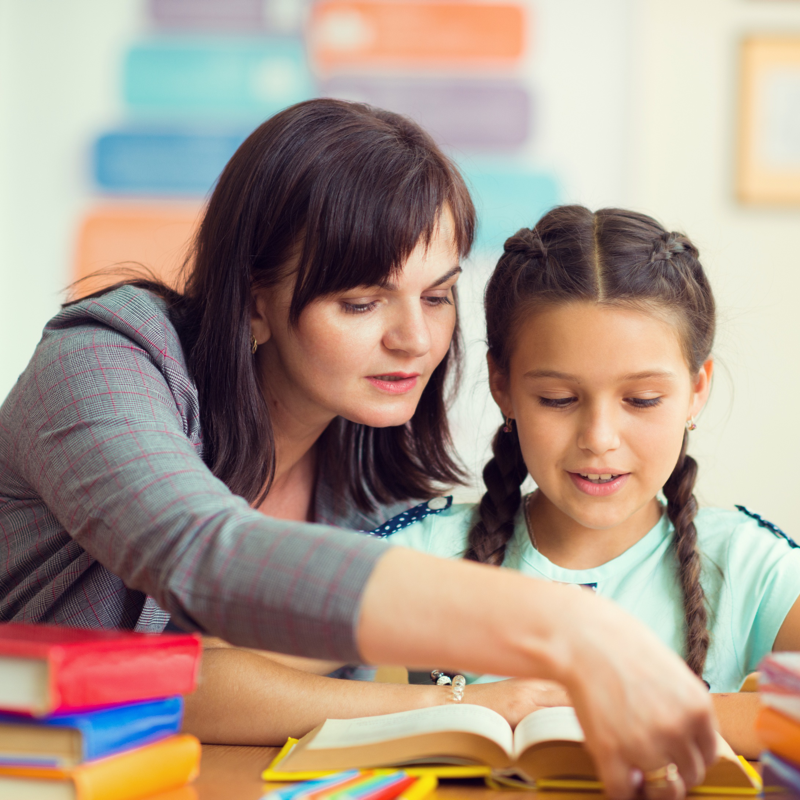As a parent, one of the biggest challenges you’re managing right now is how to let your kid be a kid during the pandemic and go back to school safely. It is important to prepare and train your children about going back to school while taking safety measures. Even though there will be a lot of changes, these tips can help your children get ready for school. If your child is going for in-person learning please check out this toolkit provided by the CDC.
1. Read, Read, Read
Simply reading to or with your child every day is one of the most powerful things you can do to improve your child’s chances for success. If you look at the body of research on literacy, it consistently states that the best way for a child to become a better reader is to read. As someone who has been teaching for 12 plus years, I can tell you that it is usually pretty apparent which students engage in daily reading practices outside of the school day. Aside from any other task or academic work, this is by far the most important habit to get into. While the research on the benefits of nightly homework is questionable, the benefits of daily reading have proven to be undeniable. Educators typically recommend ten minutes per grade level (i.e. 20 minutes for 2nd grade), however, every little bit you can squeeze into your family’s schedule is so helpful. If your child hasn’t been reading over the summer, ease into a daily schedule by adding 5 minutes each day. Remember, daily reading doesn’t and shouldn’t have to look like a serious academic task and all reading counts! Your child can read to parents, siblings, grandparents, cousins, or even the dog. Additionally, you reading to your child (even your older children) is also beneficial and counts. If you’re not already, this is the number one thing to implement into your family’s schedule every day of the year.
2. Create Authentic Writing Tasks
When our children participate in sports like soccer or learning a musical instrument, we are very aware of the importance of consistent practice. Sometimes, we forget that this is the case with other skills too. Just as with reading, the most crucial factor to your child becoming a better writer, is to WRITE. Learners must have the opportunity to develop their writing practice, build stamina, and begin to identify themselves as writers. I must caution you, however, that the process of writing is difficult and comes easily to only a few. Because the act of writing involves the combination of many cognitive processes, it can quickly become a task that your child finds cumbersome and begins to hate. It is imperative, especially in the summer months, to keep the act of writing fun. Here’s my go-to advice for fostering a love for writing in your home:
- Never force your child to write for long periods of time, unless they choose to keep going
- Focus on giving your child opportunities to be creative and translate their thoughts onto paper/computer rather than overly focusing on perfect spelling and grammar
- Create purposeful and authentic writing tasks that feel fun and not punitive (postcard writing, creating recipes, writing letters to friends they miss, creating a how-to book based off of a summer project, comic books, travel journals, etc.)
- I LOVE getting letters from old students. Have your child pen a hand-written letter or send an email to an old teacher they adore. Not only is it great writing practice, it is also an act of kindness to show appreciation.
- Model the skill in your home by allowing your children to see you engaging in some form of writing.
3. Help Build Math Automaticity
Automaticity is the ability to recall basic addition/subtraction/multiplication/division facts quickly and accurately. Fortunately, many schools teach math conceptually (understanding that 5 x7 means 5 groups of 7) now as opposed to having students remotely memorize facts without understanding the significance like math was taught in years past. However, this does not mean that there is no value in children knowing their facts quickly. As math fundamentals build on each other year after year and students begin to work on multi-digit problems, geometry, long division, etc., it’s crucial that students have strong automaticity. Students who have to stop and work through the basic facts will find these lengthier, multi-step problems laborious. Fact recall is one of the first things that slides over the summer break. The good news is you can start now to rebuild the fluency through fun and engaging activities:
- Search Pinterest for an endless world of ideas (Seriously, endless)
- Practice skip counting throwing a ball on each count
- Look up fun songs and rhymes or Youtube. There are some really amazing raps and catchy tunes that people have created.
- Quiz your child in the car, bath, while making dinner together, waiting on the subway, etc.. It takes only several minutes a day to strengthen their fluency. Get creative with your time.
- Create a homemade fact bingo game and let them choose fun game pieces
- When in doubt- purchase the good ol’ flash cards on Amazon.
4. Work on Independence
During the school year, your child has to share one to two adults’ attention with 16- 20 plus other children. Each day the teachers strive to meet each child’s individual needs with love and attention while also building autonomy and independence by requiring each student to do the things which they are absolutely capable of doing on their own. One of the biggest challenges teachers face at the start of the school-year is fostering this independence. Summer breaks will create an inevitably smaller student-adult ratio, and we LOVE that for your child. It gives them the one-on-one time they so deserve and need that we are unable to give them. During the summer relish in this time and enjoy each other. However, as August rolls around and the school year looms, be very conscious of building back that independence in your children’s lives and prepare them for a smooth transition when they will be forced to share materials, attention, and love with their peers.
5. Play Games
Not only are games fun and a great way to bond with your children, but they also innately build strong socio-emotional skills within your child. Playing games and activities helps your child problem solve, collaborate, share, think of others, develop patience, and most importantly-lose. Have a family game night, set up some playdates, and let the good times roll. If your child has a hard time losing and expresses frustration, this is a great teachable moment to work on feeling the feels but moving past in a productive way. There are many games that can be played outdoors, invented on the spot, or you can purchase some classic board games if you don’t have any already. Bonus: many board games can also help develop math and literacy skills.
6. Work on Digital Literacy
Love it or hate it, your child is a digital citizen who must develop this new form of literacy. While I’m not talking about letting your child spend hours in front of a video game or cell phone screen, I do think it’s important to have them occasionally practice these new digital skills that will come up throughout the school year. Some ideas to have them practice:
- Find a typing program that has them build their typing skills and speed
- Look for basic online coding games. Coding is an essential skill that many schools are requiring now. It is still something rather obscure to most adults, but I assure you, it is imperative that your child learns this skill.
- If your child is older, have them learn to create a Google Doc, a slideshow, or Imovie. It is a very common practice in classrooms now to use these during individual and group projects.
As always, there’s a lot out there that we don’t want or need our young ones exposed to. Always use vigilance when having your child engaging in any online activity.
7. Provide Plenty of Time to Play
As someone who spends each day in the classroom with your child, I can guarantee you that they work hard. They work really, really hard. Any break from school is crucial for allowing your child to decompress, relax, take a brain break and just be a kid. Physical Education, recess, and movement breaks are in short supply during the school day and the increasing academic load we place on our students is taxing and gives them no room to run around and enjoy their freedoms. While it might be tempting to overload your child’s next few weeks with the above mentioned academic refreshers, those should still only be taking up a small portion of your child’s day. Letting your child run free, play with friends, and enjoy their summer is one of the most important things you can do to create resiliency, prevent burnout, and foster a healthy relationship with the school.
8. Spend Time Together
Before you know it, you’ll be snapping that first day of school photos for social media, kissing your child on the forehead, and sending them off to grow and learn for another school year. The number one, most important thing you can do during these last few weeks before school is spending time together, have fun in each other’s company, and cherish the moments. You’re sure to create lasting memories that they can refer back to as they write stories, share adventures with friends, or find themselves having a harder day. Maybe go for a walk in the park, enjoy a delicious family meal or visit an aquarium.
By Jennifer Belcher
Jennifer Belcher has been an educator for over 12 years. She has experience in public, private, and International schools. Jennifer has served as an elementary, middle and collegiate level teacher. She has lived in Jersey City for over 3 years. Currently, she is a private tutor, freelance writer and social media manager.







